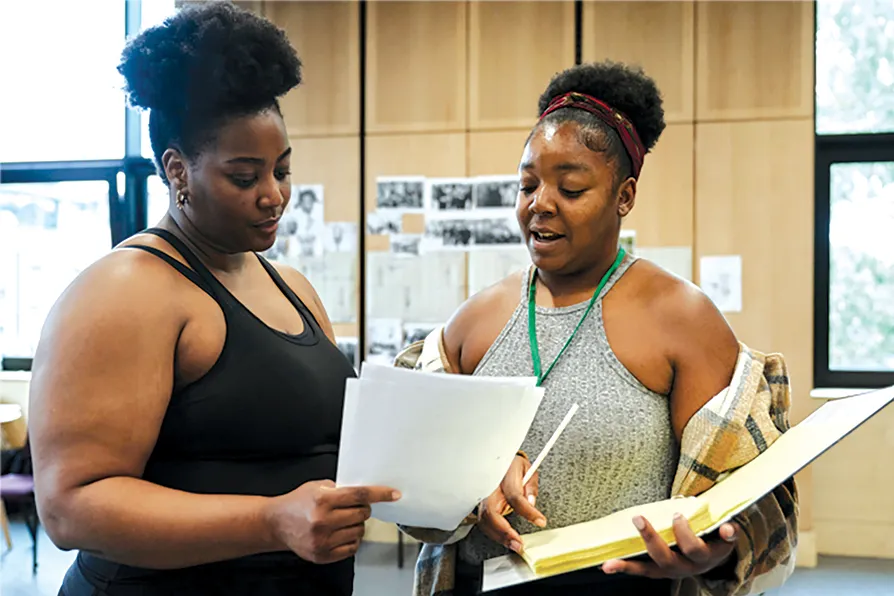STEPHANIE DENNISON and ALFREDO LUIZ DE OLIVEIRA SUPPIA explain the political context of The Secret Agent, a gripping thriller that reminds us why academic freedom needs protecting
MAYER WAKEFIELD speaks to Urielle Klein-Mekongo about activism, musical inspiration and the black British experience

 Urielle Klein-Mekongo (right) rehearsing with Rochelle Rose / Pic: Ali Painter/Brixton
Urielle Klein-Mekongo (right) rehearsing with Rochelle Rose / Pic: Ali Painter/Brixton
BLACK POWER DESK was the name of a special branch unit set up in 1967 by the Labour Home Secretary, Roy Jenkins, to monitor black activism. Klein-Mekongo has has seized the name back to make a musical that draws on black activism in the 1970s — the cases of the Mangrove Nine, the Oval Four and the Stockwell Six to excavate a picture of the role of women in leading black activist movements at the time.
“I felt for Altheia Jones-LeCointe and Barbara Beese, who were part of the Mangrove Nine and stood up in protest for the restaurant, The Mangrove, which was a hub for multicultural London. After that, it was a matter of putting black women at the front of the story because I think there is still not enough strong, multidimensional female roles out there.”
Although overshadowed by Darcus Howe, Jones-LeCointe provided the inspiration for the character Dina. “She was all about joint leadership,” says Klein-Mekongo, “she was never about saying ‘I’m the leader of this movement’. She is an activist, a woman who will stand for her community, a woman who ran Pan-African classes and fundraisers for the black education movement.”
In the show, Dina exists in contrast to her sister Cici who prefers to live “in her humanity” and to have a family. She says: “I don’t want to be defined by my blackness so harshly. Why can’t I live a more simple life?”
This juxtaposition of different attitudes allows Jones-LeCointe to pose the question around which the show revolves: whether activism is too costly to a black person’s humanity. “These people had families and loved ones, she says. “A lot of this activism got in the way of their family dynamics and caused a lot of trauma in their lives. I wanted to honour that.”
Not wishing to invade the privacy of the descendants of the Mangrove Nine, she opted to write them, instead, “a musical love letter to let them know that they are honoured and respected by those living today.”
The need for such a show is undeniable given Starmer’s shameless allusion to Enoch Powell’s Rivers of Blood speech and the way it dodged the issue of reparations for slavery. “There has not been any accountability for the pain and trauma that has been inflicted upon the black population of this country, be it from Labour or Conservatives and we should be holding them all accountable,” she says. “Wealthy families were still receiving compensation for slavery up until 2015!”
When it comes to the current state of black activism and “our generation”, they were asleep until Covid and the death of George Floyd. When many organisations and companies, even the drama schools, were putting Black Lives Matter up and doing Black Out shows, people responded by saying “What’s going on? You didn’t care about us up until now – stop doing the PR, fake allyship that you’re doing now when the reality is that you need to change the system that you have built that is counterproductive to supporting us. I would say our generation has woken up a little bit but we still have a long way to go.”
Despite being set in a period before the the creation of Brixton House, she feels that “this venue is actually very appropriate for telling this kind of story. The Black Cultural Archives is just down the road, we’re literally in the heart of black resistance and culture.”
Inspired by the musical Hamilton she feels that the black community “deserved a show that had that element of yesterday’s story being told in today’s voice.”
“I had a few songs written already that I thought would work beautifully and then my best friend and co-lyricist Gerel Falconer – he’s a rapper, one of the best barrer’s [lyrcists] in the game – I brought him in and I just knew from that we were going to have to write a lot of this music together. We actually created a new role in the industry through this process called Rapperturgy, where we encourage real rappers to come into the theatre space and write raps for theatre shows.”
The seven-year genesis came together when Rennel Shaw joined to team to sprinkle “magic dust all over the music.”
“Black Power Desk is a call to arms, not just for the black community but for our allies too. For them to understand and see the humanity in our black experience. We just ask that people come to enjoy the experience and carry forth the artivism I’m trying to put out there.”
Black Power Desk plays at Brixton House Theatre from September 1-28 then touring at Warwick Arts Centre, Lowry and Birmingham Hippodrome.









